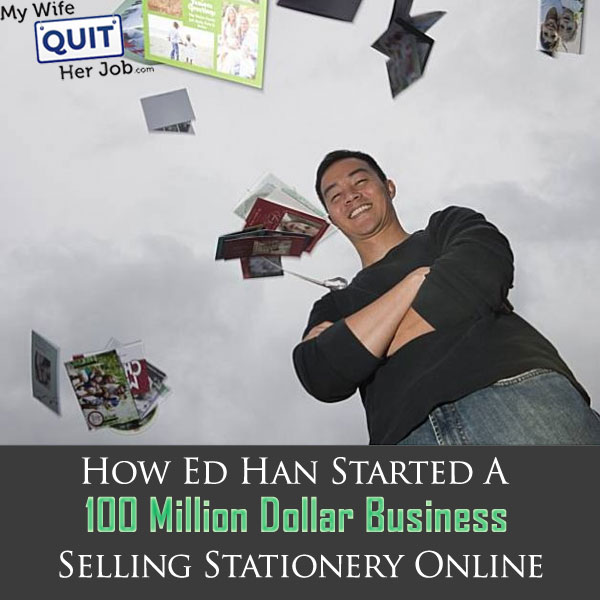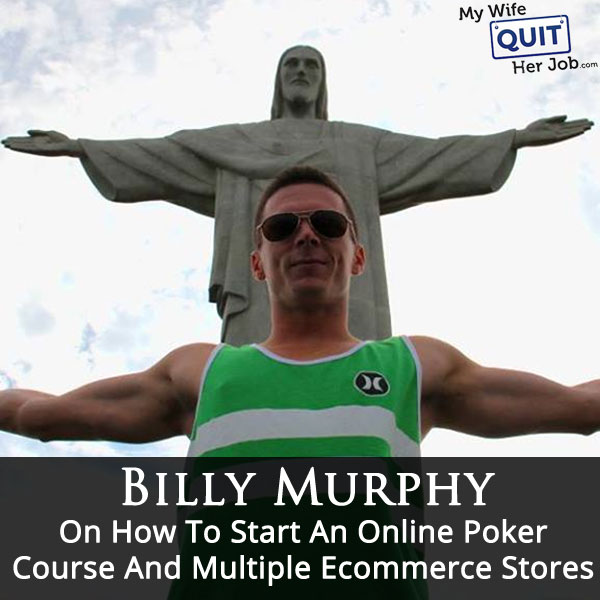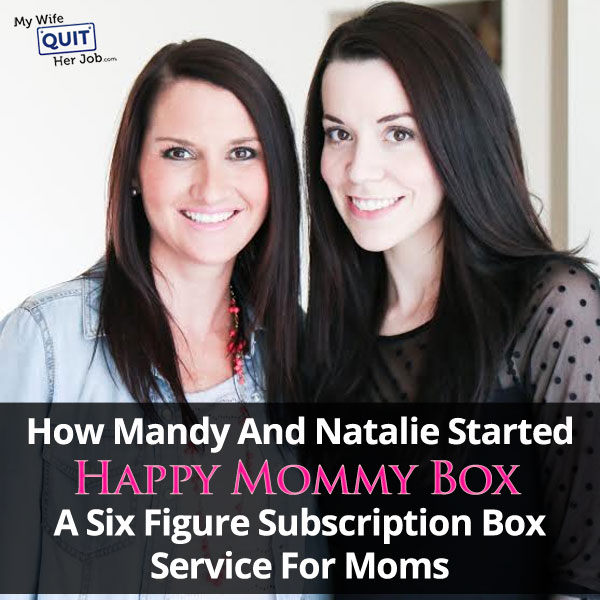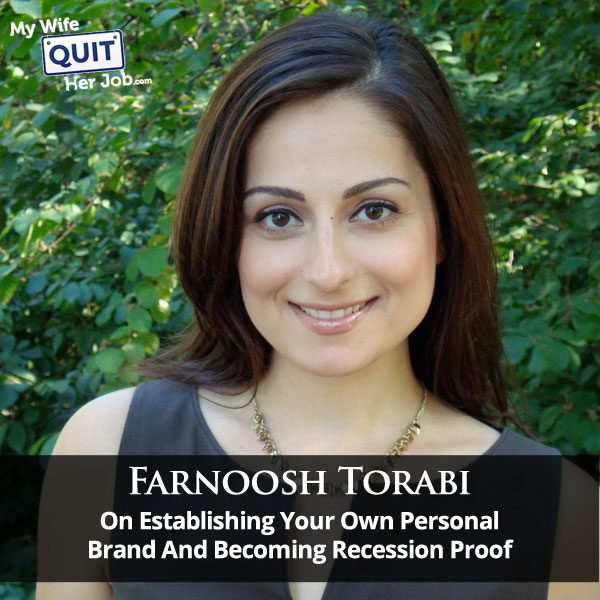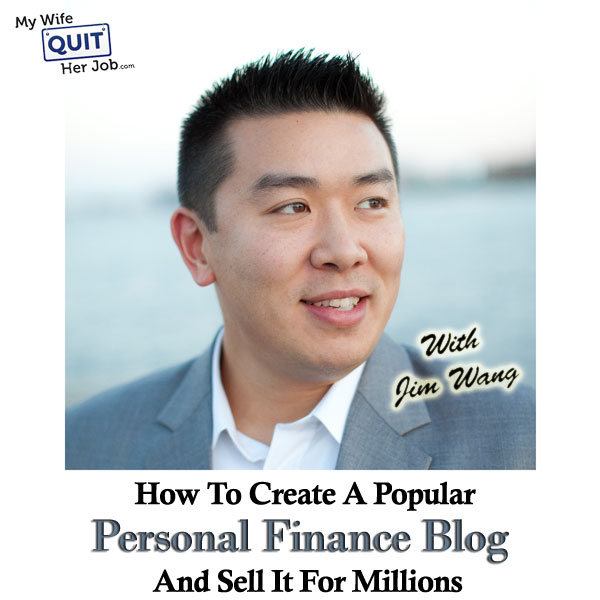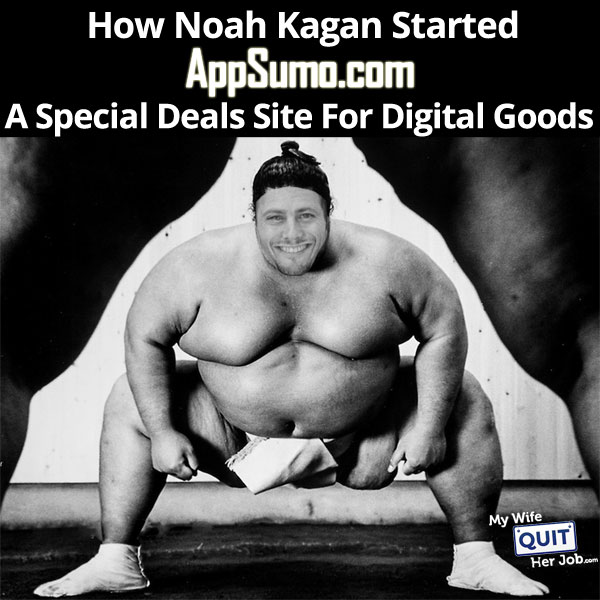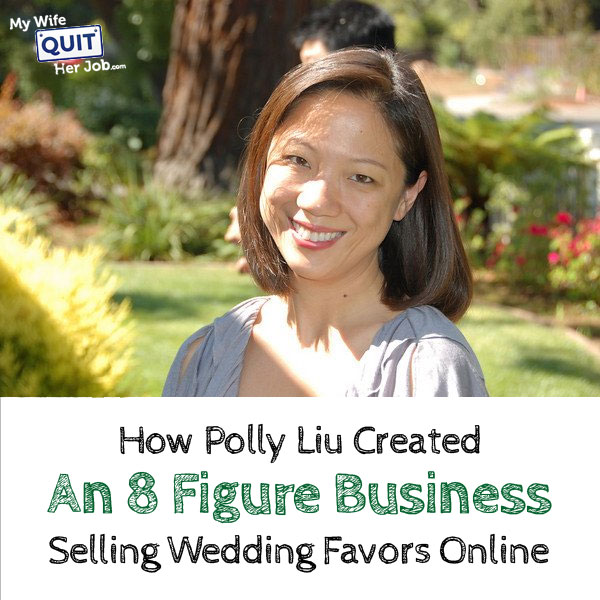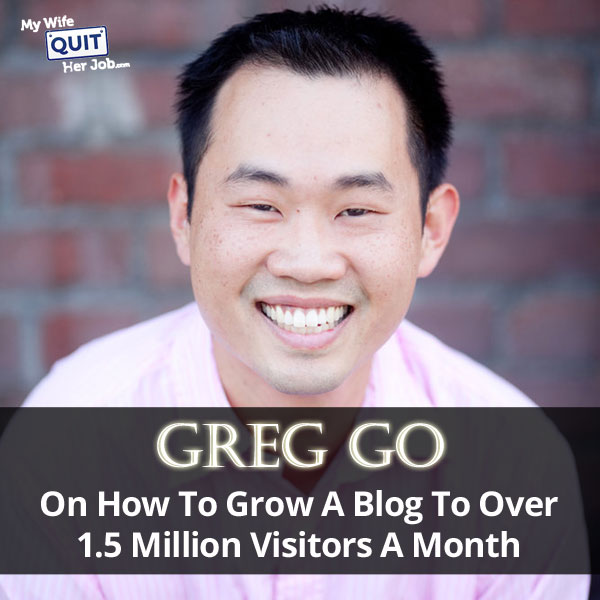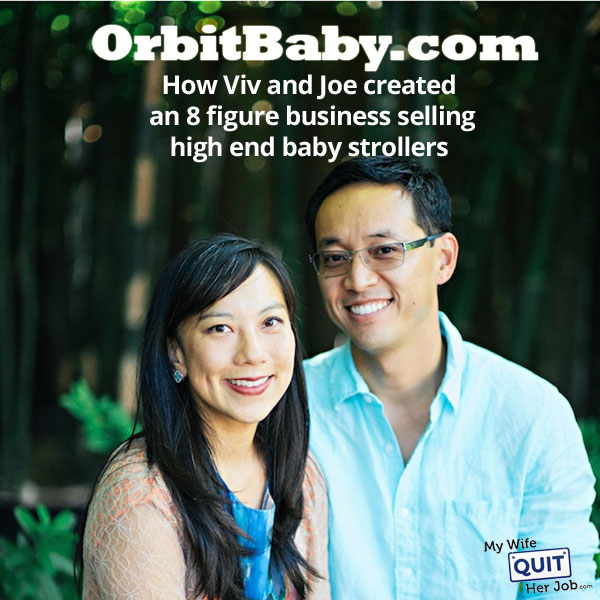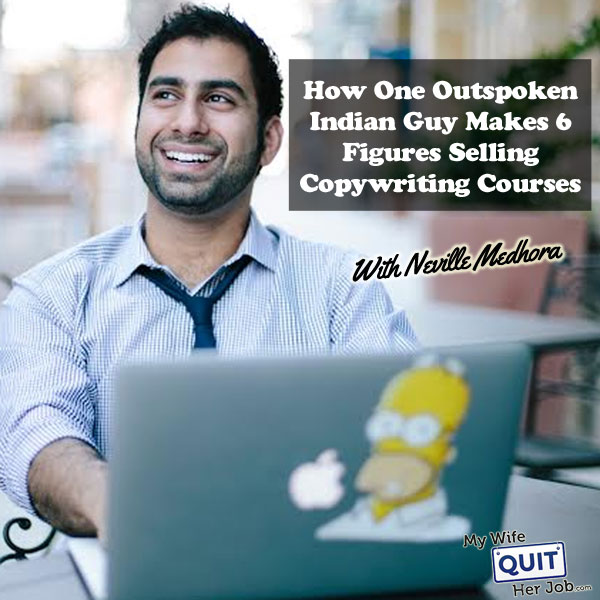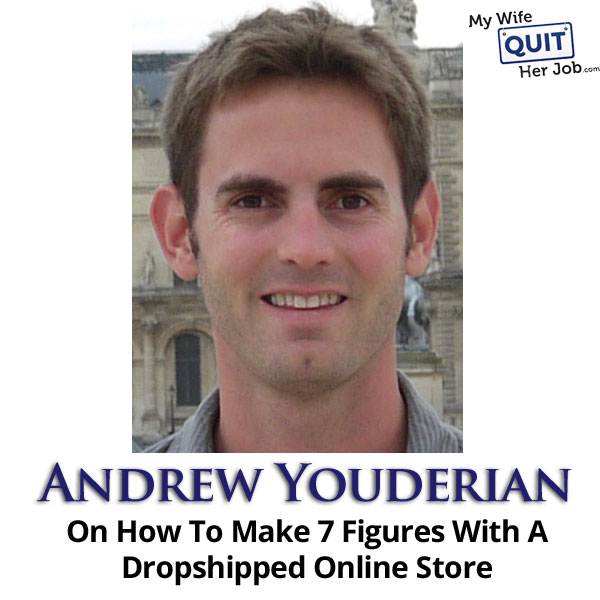Podcast: Download (Duration: 45:05 — 41.6MB)
Today I’m excited to have Jessica Larrew on the show. Now what’s unique about Jessica is that she got laid off from her job where her husband was actually her boss. But instead of wallowing in pity, she decided to start a business selling goods on Amazon and now manages to make a nice 6 figure income in doing so.
Today, her husband quit his job as well and they both run their business together. A very inspiring story that you all should check out!
What You’ll Learn
- How Fulfilled By Amazon works
- How Jessica makes 6 figures a year working one day a week.
- How to find clearance goods to sell on Amazon for profit
- How to find profitable goods to sell
- Jessica’s criteria for finding goods to sell.
- The advantages of using Fulfilled By Amazon versus carrying your own inventory.
Other Resources And Books
Transcript
If you enjoy this podcast, please leave me a review on iTunes, and enter my podcast contest, where I am giving away free one on one business consultations every single month. For more information, go to www.mywifequitherjob.com/contest. And if you are interested in starting your own online business, be sure to sign up for my free six day mini course, where I show you how my wife and I managed to make over 100 K in profit in our first year of business. Go to www.mywifequitherjob.com for more information, now on to the show.
Welcome to the ‘My Wife Quit her Job’ podcast. We will teach you how to create a business that suites your lifestyle so you can spend more time with your family and focus on doing the things that you love. Here is your host Steve Chou.
Steve: Welcome to another edition of the ‘My Wife Quit Her Job’ Podcast. Today we are going to be talking to Jessica Larrew, and I initially heard about Jessica from Pat Flynn’s podcast, and when I heard her story I knew I had to have her on the show.
Now, Jessica runs a business where she purchases surplus goods from stores, and then sells them on Amazon using Amazon’s ‘Fulfilled By Amazon’ program. And as a result, she doesn’t have to carry any inventory. Amazon takes care of shipping, fulfillment and returns, and you know, her story particularly struck a chord with me, because it reminded me of the old days when I used to kind of comb the craigslist Ads for bargains and sell everything on eBay. And I even got to the point where I wrote a script that would instantly alert me of potential craigslist deals so that I could be the first one to pounce.
Anyways, Jessica’s operation is obviously much more sophisticated than mine ever was. So I’m really happy to have her on the show today to talk about her business. So welcome Jessica.
Jessica: Thank you for having me Steve.
Steve: Yeah so, can you just give us a quick background story, I mean, I gave a very quick overview, but if you can just kind of give a background story and tell us about your business, and how you got started, and kind of what your motivations were for starting your business.
Jessica: Sure, I wish I could say it was all so smooth in the beginning, but of course it wasn’t. Like you I had other online endeavors, and so I started messing around in eBay first, and that was a lot of going to the yard sales and picking up used items, and selling them on eBay, sending them myself, doing what the customer returns etc.
So, it got where I couldn’t move forward, there was just nowhere else to go. So, I was doing that while I was working, my job, I was working full time, and at that point we didn’t have any kids or anything. And the day came whenever I lost my job, and it was really devastating for me, and I didn’t know what I was going to do from there.
And I had heard about people talking about using Amazon’s fulfillment by Amazon program, and I thought that’s going to work for me. I can make that work. And so, I really started looking into it, and I learned a lot, and then I started implementing what I learned, and I was able to quickly replace the income that I lost from my previous job.
Steve: So, can you give a little bit of… oh sorry.
Jessica: Go ahead.
Steve: You could just give a little bit more detail about, you know, what fulfilled by Amazon is, because I’m sure a lot of the readers don’t even know what that is.
Jessica: Yes of course. Web fulfillment by Amazon is– it’s a program where sellers like myself, we can use Amazon’s system, where we can– it looks like we have a store frame, but we don’t have to do any outside advertising, everything goes on the main Amazon.com website.
And if you go to Amazon and you look up your favorite item, you will see on the site right bar where it says, ‘also available by’, and there is all these seller names listed. Well, those are people just like myself where they’ve put those items available on Amazon. Well the thing is Amazon does all their own advertising, so that takes out a huge thing for people who do e-commerce.
And then the other thing is, they will store all of our products, so when we buy things, we send everything to their fulfillment centers. They have fulfillment centers all across the United States and even in other countries now, but I just do the United States.
So I package up all my products and I send them to their fulfillment centers all over, and they hold all of my items for me. Once those items sell, I am able to not have to do anything with that order, and Amazon takes care of it all for me. They will pack it up; make sure that it arrives safely to the customer, if there is ever any customer issues they get notified first. If there is any major problems like a complaint about the item and the customer isn’t satisfied, and they don’t want to just ship it back, then the e-mail would go to me directly, and I would respond to that, and take care of it.
But other than that they take care of like 95% of everything once I purchase the item and send it to them. So it’s a lot of upfront work, and finding the products and sending it to Amazon, but once it’s listed, it’s pretty much, it runs itself.
Steve: Okay, so does Amazon handle all the returns as well, they ship it back to Amazon and not you I would imagine is that correct?
Jessica: That’s correct. And that’s actually one of the things that’s a little frustrating for people if when they first come to Amazon because, if you’ve shopped on Amazon they have like, 100% you can send the item back for any reason. And so, if you come from any type of e-commerce background, you like to have control over that. And so with Amazon, if a customer says, “Hey, I want to return this”, for whatever reason – buyer’s remorse, it’s damaged, defective – whatever, Amazon just takes that item back, but the good thing is we don’t have to deal with it.
So, they send the customer shipping label, the customer sends it back to their warehouse, and from that point the sellers have an option to either have the item sent back to them, like, we can decide okay, ‘is it broken, or is there nothing wrong with it’, if they just had buyer’s remorse, we can send it back and then resell it. If it’s damaged then we just take a loss.
Steve: Okay, okay, sorry I didn’t mean to interrupt your story, so, you actually have a very interesting background with how you actually lost your job. So if you want it just tell that story real quick, it’s actually quite interesting.
Jessica: Yeah, it’s kind of one of those stories where it’s almost– it’s kind of sad to tell it. But, my husband and I were working together, and he was technically my boss, and that happened over a period of time where we got transferred around from stores, and eventually he was technically my boss.
And so, we had gone through, when the economy really collapsed, and we were in the housing market, and so our company had done a ton of layoffs. And I made it right up until the end, and I just never thought that I would get let go because my husband was my boss and – it’s kind of embarrassing to say that – but I mean, that was job security for me, you know. And what happened is, they did have to make more cuts, and so I was pretty much the last on the chopping block.
And they pretty much said, “Hey, we are letting your wife go, we won’t make you do it, but she is going to get let go.” And so it was really a rough time for us because– for him too, it was like he had no control over that. And so they kind of moved him out of the way, and then called me in, and when I came they said, “This is your last day”, and I’m like, “Really? I didn’t see that coming”. Because you know how in a company when they start to do layoffs, you kind of have that idea like, ‘Okay, this person’s gone, this person’s gone, if they have to do more, where am I?” Well, I didn’t see myself on the list, at least not for like, four or five more but…
Steve: Yeah, I can imagine especially if your husband was your supervisor.
Jessica: Right.
Steve: So, did you actually, when that happened, did you think about looking for another job, did you have kids at that point or?
Jessica: We didn’t have kids, and we just have one now, but we had known that we wanted to start thinking about having kids. And for me I always wanted to be a stay at home mum, but it didn’t seem fathomable to do at that time. And so, now when I look back at it, it was really a blessing because it made that decision for us. That we could do things without me working a regular job, and so I knew right away I didn’t want to go back and work for somebody, I just didn’t know exactly know how I was going to do that. And so that’s why I was really experimenting with eBay trying to make that more. And once I realized that wasn’t going to work, then I put all my eggs into the Amazon basket.
Steve: Okay, so when you lost your job, you already kind of had started experimenting with these services, and so that kind of gave you the courage to not even bother looking for another job, is that…
Jessica: Yeah exactly. I knew that there was definitely potential, and I didn’t know how big it was at the time, and so I’ve definitely been surprised at what we’ve been able to do in the last few years. But I knew that there were options out there to make money online.
Steve: Yeah, and so that’s probably another reason why your story resonated with us, because you know, my wife had the same thing. We wanted to start a family, and she wanted to stay at home with her child so– yeah it is a very valid reason for wanting to start your own business. So if you can just walk us through– and so let’s start with the good stuff first, so how much did your business make last year?
Jessica: Last year our gross sales were just under $300,000, like $297,000, and our profit after all of our inventory expenses and Amazon expenses, we netted just over $100,000.
Steve: That’s amazing, and how many hours would you say that you spend on this, and how much time do you get to spend with your child?
Jessica: Well, we get to pretty much spend unlimited time with him. What we do– in the out this, and what I’m telling you now is our now story, you know, it took a lot more work in the beginning, and we’ve just gotten to where have a good system down now.
But what we do now is, we try to work one full day a week, and that means five hours to us, so you could always say that that it’s like, “That’s not full time.” So we work five hours on Mondays, and that’s when we buy all our inventory. And then we take one to two days the rest of the week to send that inventory to Amazon.
And we do that with our son here, and so we can only do two to three hours at a time, because he doesn’t like us doing it, because you know he can’t really work in it. So we either do it when he is in bed, or we’ll do it during the day where one of us can hang out with him, and the other one can work. And so we spend the ten hours between the both of us on Monday’s, sourcing for inventory, and then we spend between five and ten hours the rest of the week getting that inventory to Amazon.
Steve: So if you can just kind of just walk me through, you know, a typical day or a typical week I should say, you know, how does your business work exactly? I would imagine that the finding the deals part is the hardest part because Amazon takes care of the rest, right?
Jessica: Right. It’s pretty much the selling thing that you have to worry about. And so I tell people that if you want to make $3000 a month in profit, like that’s what you need in order to survive or to quit your job or whatever, then you have to be actively sending in at least $3000 worth of inventory a month, and that would be your cost.
And so for us, we want to be making between $4000 and $5000 a month. So we have to be spending four to five thousand dollars a month because we are always trying to double our money. So if we can go to one store and we can spend $700 then that makes a big cut on what we have to spend the rest of the month.
So it is always a numbers game, we’re just trying to find enough inventory to meet our quarter. And there will be months where we buy a whole bunch of inventory, like we’ll spend $10,000 on inventory, and so that will make the demand that we need to meet the next few months lower. So if we spend $10,000 this month, we can just spend two to three thousand next month, and two to three thousand the next month, makes sense?
Steve: I see, so does the inventory that you buy, does it go straight to Amazon or does it come to your place first and then go to Amazon.
Jessica: Oh, sorry I should probably clarify that. So we– actually we go to stores physically ourselves and we look for items. So we bring it home with us. So if we are shopping at like Target, we’ll buy the items, and then if we have things that we know are going do well, then we’ll go to multiple Targets and buy the same item. And we bring all those home, and then we process them here.
So there are ways that you can purchase inventory online, and you would have that shipped direct to you, or there are third party services that you can use that will actually label and process your inventory for you if it’s purchased online. But for us and the way that we run our business, everything comes to our house with us, and then we process it from here.
Steve: Okay, so you mentioned Target as one of the options, so what would stop someone from shopping on the Target website directly as opposed to just going to Amazon and paying more.
Jessica: Well, the main source of our inventory is discounted items, and I don’t know if you’ve ever looked at the same item on Target’s website as looking at Target in the store, is there prices are different. So we can find things in the Target store that’s local, that’s 70% off, but if you look at the website it’s still full retail price.
Steve: I see, okay.
Jessica: So it’s totally different schedules.
Steve: I’m actually no stranger to the sales section on Target, sometimes they have these killer sales, so I imagine those are the ones that you are talking about, right? So when you see something that’s good you kind of just snatch it up and buy it all, is that-
Jessica: Right, exactly.
Steve: Okay.
Jessica: And we do, if I find something or watch it on target.com and see if it gets discounted to that same price, and then I’ll order it online as well. But the thing is, for a consumer when they are looking at the item, they may not need it in that exact time frame.
So if they don’t catch it when it’s on clearance on target.com, then they have no idea whether even was on sale, and they don’t want to do the hunting, we like to just go to Amazon. I don’t know if you shop on Amazon, but they make it super easy, so I even buy just for convenience a whole bunch of stuff on there, because I don’t want to have to go and hunt for it myself.
Steve: Absolutely, I’m a prime member, and I will just buy really small items because the shipping is already included, so it’s very convenient, yeah. So, in order to be able to spot these deals, you kind of already have to know how much things are worth in a way, so do you have some sort of tools that you used for that or do you just know what the prices are for the stuff that you want to buy.
Jessica: I wish I did because that would mean it could have been a whole lot easier. But after a few years there are things that I can recognize brands, and I try and stick the things that I know. But for things I don’t know, there are great tools that you can use. There’s the app set, you can download on your smart phone and you can scan the bar code and see what the selling price is on Amazon. And if you have an app that is made for sellers then it will tell you what the Amazon fees are, and how much profit you are going tomake on that item. So all you have to do is look at your cost of the item, and then you will know exactly how much you are going to make off of that item.
Steve: I see, so as you are kind of going through these stores you have your phone on you, and you kind of just scan if you don’t know, and you just see instantly what the Amazon selling price is.
Jessica: Exactly. And the thing is that, you know, if you are dealing a lot with clearance items, you will look at things and go, okay well, this is 75% off, there has to be money, they are making it. And the funny thing is that there isn’t always a lot of money to be made in it. I was looking at this Wii U component at [indiscernible 00:17:03] yesterday, and the regular price was $30, and it was on clearance for $6. And I was like, “Oh wow, that’s going to have to be able to make money”, and so I scanned it and Amazon was selling it for $6. So I was like, “Wow”. So it’s like there’s this whole dimension to the way Amazon works, because their number one goal is to bring the best price to a customer, right?
Steve: Aha.
Jessica: And as for a seller, we want to make the most money that we can, and so we have to be able to find that happy medium if Amazon is selling that item then obviously I’m not going to be able to make any money on it. But if Amazon wasn’t selling it for $6 there probably would have been potential for me to sell it for a higher price.
Steve: Yeah, so, is there a particular type of item that you guys kind of focus on or do you just kind of just sell a wide variety of stuff.
Jessica: We sell a wide variety. You can sell pretty much any category, you can sell clothing or jewelry or automotive items, so we can go in any department. For me personally, I like to stick with like, health and beauty items, grocery items which is a big shocker to people, that people buy groceries on Amazon, and then also the toy category, I like to sell toys. Toys is one of the areas where you can actually buy things at retail price, and you can sell it for a markup. So it’s like it’s not always hunting just for clearance items like I talk about when I got started.
Steve: Interesting, I would love to hear some examples, so what is an example of a toy that you got at retail and were able to sell it for higher.
Jessica: Well just recently, the movie frozen came out, and so it’s like the biggest movie that Disney’s done recently, and it has a huge following. And so there is a lot of toys from that line that we are able to buy right off the shelf and resell for more. So for example, there was one doll that cost $16 at the store, but the problem is you couldn’t find the doll, unless you were like looking for it all over the place. And so that doll we were able to sell for between $39 and $45 a pop. So if we found ten of that doll then, you know, we would make $150, $200 after fees.
And so they are not as easy to come by, but once you find them they’ll last a couple of weeks and then you just kind of do it well at [indiscernible – 00:19:36] and then once supply gets back into stock then you just let it go. Which is frightening because that’s the song from the movie, I didn’t plan that.
Steve: What’s hilarious is my daughter is obsessed with that movie, and incidentally we’ve been looking for an Elsa dress, and an Elsa doll, so maybe after this interview I’m going to have to contact you and figure out where to get that stuff. So you are the one who’s been hoarding all that merchandise.
Jessica: Yeah, that’s kind of one of those things where you don’t really want to talk about it too much, because then people realize you cannot always the good guy bringing them the stuff that they can’t find. It’s like, you are also creating a little bit, which probably added that out. But that’s what it is, because you know, like sometimes you are going to an area that you can tell doesn’t get shopped that often.
And you will just find like this huge supply of something that is nowhere to be found in bigger areas, and so we are going to start and find like ten of those dolls, and then, but locally like, if I was to look for it at the Target down the street from me, it’s been empty for months and months and months. So it is just kind of like finding a little pockets and sell what we do as sellers is we distribute the inventory to where people actually want it.
Steve: Right, that totally makes sense, yeah, because it is definitely a distribution problem, right, especially when a big store has to service a whole bunch of stores in more remote areas of the country as well.
Jessica: Right, and you just never know where the demand is going to be for certain items and so if a store is sending it everywhere, of course there is going to be stores that sell out really quickly and then stores where it just never sees the time of day.
Steve: So walk me through how groceries work, that just seems counter intuitive to me, since there is an expiration date.
Jessica: Yeah, so with groceries there is kind a lot more rules that go into play for sellers. We can’t sell items that are going to be expiring within 50 days. So there has to be time for you to get it as a consumer and use it. So we have to keep track of those things. But the thing is, there is always items that I can find that you can’t find, just like we said with the Elsa doll and the Elsa dress.
I can find different flavors of cereal that you may not be able to find locally, or want to search for. And so what I’ll do is, I’ll just bring those to you on Amazon market place, and of course I am going to charge you a premium to do so, but you don’t have to go and look for it. And there’s items like that everywhere only you can find in your area.
Steve: Interesting give me an example, I’m very curious.
Jessica: You’ve put me on the spot, and I can’t think of one.
Steve: Oh, we can go back to it later, you know, you can have in the back of your mind, but yeah, it just blows my mind that there is flavors of cereal even that are just kind of geographically distributed, that’s amazing. Well you know-
Jessica: I have the blue diamond omens, are really local for me, and so, I may have flavors here that you don’t have, because the plant is here right by where I am
Steve: That makes sense.
Jessica: And so, I may have like a [whole opinions??] flavor, a chilly flavor, chocolate, and maybe you don’t have those ones. And so I can buy them locally at regular price and save $3 a can, then I’m going to sell those for like $12 a can.
Steve: That makes sense, because when I went to Hawaii, I noticed there is a bunch of flavors of some of their chips that I like, that can only be found there, and okay so, I kind of understand now.
So there is an expiration date associated with it, so let’s go back to how this whole fulfilled by Amazon works. So, let’s say you have items in their stores that are going to expire, so how does that work exactly.
Jessica: So we try and keep track as a seller of when our stuff is going to expire, and when we send it to Amazon we label it for them, so that they can see in a format that they are used to when it expires. And then once it gets to where it’s going to be close to expiring, what a lot of us will do is we’ll just discount the item so that it will sell quicker, and put in the notes that it’s about– that it expires on XYZD, and then try and sell out.
If it doesn’t sell out within that 50 day period, because they won’t ship it to a customer after that, because they don’t want the customer to be upset that’s it too close to expiring. So they will just pull it off of the shelf, and then we have the option to either bring it back or have the item destroyed. And usually with food items we just have it destroyed because we don’t really want it, it wasn’t something we bought because we liked it, it was something we bought because we wanted to sell it. And so instead of paying to have it sent back to us, we’ll just have the item destroyed, and that’s kind of last resort, because like I said we always try and sell out before that happens.
Steve: Sure, sure, so are there fees associated with storage, sending back and destroying on Amazon’s part?
Jessica: There are, and there are actually really minimal whenever you think about, especially for storage if you think about the cost of a storage unit, that’s really expensive, like you are going to be over $100 a month, and I spend on Amazon around $50 a month for my storage. And so it goes per item, so you can store a book for like a penny a month because it’s really small.
And so it’s actually not that expensive, but they send it in one big bill, so it kind of looks scary whenever people get their first storage bill, you know, because they have all these items there, and we have hundreds of items there, so it’s like for us, I will spend $50 to not have my garage full of stuff.
Steve: Oh yeah absolutely. So if you didn’t want to rent a storage place could you just ship all your junk over to Amazon, or-
Jessica: Well that would get pretty expensive because we do have to pay shipping charges to send our items to Amazon as well. And so one great thing about their program is, they have all these deals worked out with places like KPS, because they have so much stuff going through their system. And so they will give us as sellers the ability to use their discount, and so if I send stuff my cost is usually between 50 cents and a dollar per pound to send in an item.
If I were to send the same item myself it’s going to be like $3 to $4 a pound to send it. So it’s definitely discounted, but there is that fee. So we try to send as much stuff as we can at one time because the larger the weight is on our shipment the lower your per pound cost is. So it isn’t really beneficial or cost effective to send in just a couple of items, because they are going to have a minimum of like five dollars just to touch that box. So if you just send in two items, now your cost per item is an additional two-fifty, but if you were able to send in ten items with that same five dollar cost, now you are cost per item is only 50 cents, makes sense?
Steve: I see, now that makes sense, yeah.
Jessica: And then the other fee that you had asked about was like having it destroyed or having it sent back. We can have items sent back to us for 50 cents an item, so it’s actually not very expensive. And they will destroy items, I think, I can’t remember that one off the top of my head, it’s either five or ten cents per item to destroy it.
Steve: Okay, the fees are relatively small I guess, depending on what you are…
Jessica: Yeah, your main fees are going to be in their commission because they want a cut off of that sale price, that’s where they are getting their money is on the sale price, and then their handling fees. So that’s how we say that overall you end up spending about 30% on lower cost items, if you get higher up because the commission is set at a percentage in a lot of your other fees are based per item, you could sell $100 item, but not spend $33 in fees because they are going to take less overall because it is more expensive.
Steve: I see, so in general you are saying one-third of the cost goes to Amazon, but that varies depending on the price of the item.
Jessica: Right, and that’s why having those apps really comes in handy as because you can take out all of the guess work, it’s not like you have to go, “Okay, how am I going to make any money on this?” like you don’t have to do the math in your head. And I know whenever we are talking about it, and we are talking about it over the phone, it’s like kind of hard to picture it all because it’s not right in front of you.
Steve: Right, right okay. I am just very interested if you could just walk me through one of your shopping trips, you said you did it every Monday, right?
Jessica: Right.
Steve: And that’s basically the amount of time that you work each week is on these shopping trips, so how do you know, how do you decide where you are going to hit, the average dollar value of the products you are looking for, you know, what are some of the factors in that decision making process.
Jessica: Well, one factor on items that we are going to sell is that I prefer not to receive less than ten dollars profit on an item because it is not really worth my time to do. If I can find something, and it’s really an expense of like a dollar and I’m going to make five dollars profit on it and I can sell like twenty of them, then I will reconsider of course, because there is a lot of profit potential. But one of our main goals is we want to be making ten dollars per item that we find.
Steve: Okay.
Jessica: Finding where to go, we have a list of places that we go and we live in the central valley of California so we’ll go to a lot of neighboring towns, and so we work that all into our schedule. So if I go say to, Wall greens, Target, Big lots, and grocery outlet, all in one day. Well, I’m not going to go to those same four the next week. I want to give them time to replenish or to get new clearance items, things like that. So and we can only go to so many stores in five hours, right? So the list of places that we can go is a lot larger than the places that we go in one day, so we can rotate these stores week by week by week.
Steve: So do these places send you mailers and that sort of thing to let you know what the sales are ahead of time so you kind of plan your week or?
Jessica: No, because what we are looking for usually isn’t something that they will be advertising, it’s something that is going to be hidden.
Steve: I see.
Jessica: And that all depends too on what model you are using. If you are using strictly buying clearance items or if you are trying to find retail items– like one of the ways that we do grocery is we would check the Ads, so that’s one time that we would actually look at the Ads. But I usually would do that online instead of looking like an e-mailer, a flier Because I just throw all that stuff away, you know.
Steve: Yeah, yeah of course.
Jessica: But you can do research like that before you go into a store, so you can see what a store has on sale. For example, if an item is going to be at the grocery store and it’s going to be buy one get one free, that’s automatically 50% off. So if I was able to sell that same item for just three times that price then I would be able to make money. And it is not going to be that much more expensive to the consumer, because I only have to go like 50% above the retail cost.
Steve: I see.
Jessica: Those are the kind of sales that we would look for, for regular priced items, we call those regular priced items mono actually. You know what I mean, they are not on clearance.
Steve: Do you assume a certain percentage will go unsold or do you usually assume that it’s just going to sell.
Jessica: Well, Amazon they have ranks on items, and you probably never noticed that as a buyer, but it’s something that we as sellers use, and the way that I can explain it is you know how there’s like the billboard top 100?
Steve: Aha.
Jessica: So the number one song is the most requested song of the month, or the week, or the day, or whatever chart you are looking at. And as it gets lower down the list or higher up the list, they are requested a lot but they are not requested as much as the number one song. So what Amazon has done is that they’ve ranked all of their items by category. So, if I was to look at an item in the toy category, well, there is going to be like 300,000 total ranks. So when I’m looking at number one, I know that it is selling really really quickly, that it’s getting and purchased multiple times per hour.
If I see something that’s ranked like five thousand, I’m going to go, okay, this is still a good rank, but it’s not selling as fast as number one. And then it goes up in numbers like that. So we kind of have an idea on how fast things are going to sell and that’s one of the ways that we decide if we are going to purchase one of something or we are going to purchase multiples as by the rank that we can see.
Steve: I see, that makes sense. So do you look at the ranks first or do you find the item first and then look at the ranks.
Jessica: It’s all about finding the stuff first, and I can’t remember if I have mentioned this on the other interview, but, I will go, and I usually find like one in ten, is my average on something that I’ll buy. So in order to find ten profitable items, I’ve usually scanned about 100 items. So a lot of times I’m going in just kind of looking blind, and then I will just scan until I find something that looks like it’s either got a really good rank or has a good profit potential. And then I will check all the details on the item from there.
Steve: That actually sounds kind of fun.
Jessica: It is fun, it actually is really fun, and it can get frustrating because sometimes, you know, you didn’t find anything in the first sixty scans, but you find ten in the next forty. It’s kind of a numbers game.
Steve: Yeah, I love finding bargains in generals, so this is just that on a much larger scale, I guess.
Jessica: Exactly.
Steve: So you know, it all sounds very doable, so what are some of the challenges in doing this, and what are some of the mistakes that you’ve made early on that you care to share.
Jessica: Well, when I first got really started into the FBA side and putting a lot of money in, was actually during the fourth quarter which is right at the holiday season so things are selling really, really quickly. And so one of my first mistakes was that I was sending stuff in too late, like I didn’t really understand the time that it took from when I was sending the stuff in until it was going to be received and ready for sale. And so after my first fourth quarter in January I had all the stuff left over and of course the price was way better December 20th than it was January 1st.
Steve: Ah, I see.
Jessica: And so I ended up with some leftover inventory and I was able to sell it and make my money back which I’m always willing to do. I’d rather, you know, cut my losses and reuse that money somewhere else, but that was kind of my first mistake was I went too heavy too late.
Steve: Okay, incidentally how long does the whole process take of getting your stuff to Amazon and then having it listed?
Jessica: It used to take less time because we would send everything to one warehouse, and so it would take like three to five days from the time that we purchased it until it was received at Amazon.
Steve: Okay.
Jessica: Now the process is changed a little bit in the last year where we actually send to multiple warehouses at one time. So I’ll have some items that are received the next day because they go from California to a warehouse in California or they go from California to a warehouse in Phoenix, and so those arrive really quickly and get checked in and are ready for sale.
But then I have other items that go all the way back east, and those ones take five days just to arrive at the warehouse and then a couple of days to get there. So you are looking at between two and ten days for your items to go active and be for sale.
Steve: Okay, so what is the advantageof shipping to different warehouses, is it a shipping time thing or?
Jessica: It doesn’t have a real advantage for the seller, it’s more of something for Amazon to cut their costs because they are shipping everywhere, and because if you have a prime membership you get that free two day shipping. So they want to have our inventory spread all across the United States. So if somebody purchases it from California, they can ship it from California or Phoenix instead of shipping it from back east.
Steve: I see, and Amazon tells you the allotment that they want per geographical location?
Jessica: Yes, and that’s based– I don’t know what their calculation is on that, but they will tell us. So for instance, in ten, they can say, okay, send two to this warehouse, send five to this warehouse, send three to this to this one, and one to that one.
Steve: Interesting, okay, so they have it all down, they know the demand for what you are trying to sell, and they just work everything out for you.
Jessica: Exactly.
Steve: Okay, so does that imply then that the items that you sell always have skews and bar codes on them then?
Jessica: Yes, because we mainly deal in new items, so they would all have a UPC code on them. And people can sell used items, but it’s not something that I would start doing like in the beginning.
Steve: Okay, so you mentioned you made six figures last year, do you plan on expanding this business, and what are some of the next steps if you want to grow this even more?
Jessica: Well, one of the things that we’ve really been debating is, how can we grow the business without adding more time, because for me the biggest thing is, I don’t want to be spending 40 hours a week on the business. I want to keep the hours to a minimum and I am happy with making the six figures, right? Especially while our son’s small, so when he gets older we may decide, “Hey, let’s turn this into a million dollar a year business in sales.” But at this point we are not there yet.
So what I’m looking at now are some different ways that I can try and increase the number of sales without adding too much more time. So I am spending more time on things like online sourcing or wholesale sourcing. Things that I didn’t want to mess with in the beginning, because it takes a lot more to get figured out, but those are the kind of the things that will take you to the next level, because they don’t take as much time.
Sometimes the profit is lower, so when we shop in store, we are looking for at least 100% or more in profit. But if I’m looking online, I’m looking at wholesale, maybe I;m willing to take like 70% profit because I don’t have to leave my house.
Steve: Right. So these wholesalers are in the U.S. or they are overseas or-?
Jessica: Right now they are just in the US that I am dealing with. There are quite a bit of people that are dealing with going direct to manufactures, and I have done that on a couple items, but didn’t have a lot of success with it, or didn’t make the amount of money I thought was worth it. So it is something that you can do, you can do overseas wholesalers or manufactures, but personally that’s not something that I’m doing right now.
Steve: Okay, so do you have any advice for some of the people listening in, you know, if they want to try your method or try to sell surplus goods of their own?
Jessica: What I would say is, just give it a shot, you don’t have to do it with a lot of money, you know, when I started I just had like $500 that I was able to invest, and people go in with a lot less money than that. And you can start with items that are in your own home. You can just– we all have those things that were given to us as gifts or that we bought and thought for sure we were going to use it and then we didn’t use it. Well, you can go and just check those items on Amazon and see what they are selling for. And if you have a board game that’s never been opened, and even if you got it as a gift then your cost is zero, right? And if you could sell that board game for $25, that’s a great way to test the waters, because now you are going to come out with $20 of investment money.
Steve: Okay, so for these beginners, do you recommend they use fulfilled by Amazon, or do you just recommend that they just dip their toe in the water and just sell on Amazon.
Jessica: I always recommend using fulfilled by Amazon, because when you come in as a seller, people can see that you are a brand new seller, and so they are going to see you don’t have any feedback, and you’ve never– to them it looks like you’ve never sold anything. And so with the fulfilled by Amazon thing, is they trust Amazon as a company, they don’t have to trust you as an individual.
Steve: Okay.
Jessica: Because they know that Amazon is going to get it to them in two days, because you are not touching it. And so I always recommend starting with fulfilled by Amazon because you are going to get a lot more exposure as a seller, instead of trying to be like, ‘Trust me as an individual’ all you got to say, ‘Trust Amazon as a company’. And then Amazon is also going to put you in front of people who are shipping their sales.
Steve: Okay, yeah so I almost never buy anything that’s not prime, and the only way to get prime is to do fulfilled by Amazon, right?
Jessica: Exactly, and that’s the thing, is that so many people do have these prime accounts, and even if they don’t have a paid prime account, they can still earn free shipping from Amazon, but they can’t do that from a merchant seller. Right now, it’s like if you spend $35 in one order, then you get free shipping, but merchant order wouldn’t count towards that, only once it’s a fulfilled by Amazon.
Steve: Right, okay, so that makes a whole lot of sense then. Okay, hey great, so I don’t want to take up too much of your time, but if you can tell our listeners where they can find you, and you know, ask you more questions about this, I think you have some sort of book that you’ve written as well that outlines the process, if you kind of want to just share that information, that would be great.
Jessica: I do have a book about how to get started and kind of why Amazon works in a little bit more detail than what we talked about, and that’s at JessicaLarrew.com. So my last name is L-A-R-R-E-W. And then I have a beginner’s course as well and that’s at abctrainingvideos.com. So it is Amazon boot camp, is what it’s called, and so it is abctrainingvideos.com.
Steve: Okay great. Well, thanks a lot Jessica for coming on the show, and you know, this sounds really good, and actually I might give it a try myself.
Jessica: Yeah, do it and let me know how it goes or if you have any questions, for sure.
Steve: But first I need to track down that frozen merchandise first.
Jessica: Yeah, that [indiscernible – 00:43:10]. Well, I wouldn’t have mentioned it if it wasn’t starting to come back in the stock more, because I would be getting hate mail from sellers all over the place like, “I can’t believe you told people to buy that”. But, you will be able to find it really quick.
Steve: Okay, thanks Jessica, take care.
Jessica: Bye.
Steve: Here is something I have noticed about every single interview I have conducted thus far. Whenever someone gets laid off or loses their job, the ones who thrive are those who take the initiative to try something new. Now when Jessica got laid off, she didn’t wallow in self-pity, instead she did something about it, and her story is very inspiring.
For more information about this episode go to mywifequitherjob.com/episode17, and also if you enjoyed listening to this podcast, please go to iTunes and leave me a review. When you write me a review, it not only makes me feel proud, but it also helps keep this podcast up in the ranks, so other people can use this information and find the show more easily to get awesome business advice from my guests.
It is also the best way to support the show, and please tell your friends because the greatest compliment you can give me is to provide a referral to someone else either in person or to share it on the web.
And as an added incentive, I’m also giving away free business consultations to one lucky winner, every single month. For more information about this contest, go to mywifequitherjob.com/contest. And if you are interested in starting your own online business, be sure to sign up for my free six day mini course, where I show you how my wife and I managed to make over a 100K in profit in our first year of business. Go to www.mywifequitherjob.com for more information. Thanks for listening.
Thanks for listening to the My Wife Quit Her Job podcast, where we are giving the courage people need to start their own online business. For more information visit Steve’s blog at www.mywifequitherjob.com.
I Need Your Help
If you enjoyed listening to this podcast, then please support me with a review on Apple Podcasts. It's easy and takes 1 minute! Just click here to head to Apple Podcasts and leave an honest rating and review of the podcast. Every review helps!
Ready To Get Serious About Starting An Online Business?
If you are really considering starting your own online business, then you have to check out my free mini course on How To Create A Niche Online Store In 5 Easy Steps.
In this 6 day mini course, I reveal the steps that my wife and I took to earn 100 thousand dollars in the span of just a year. Best of all, it's absolutely free!










